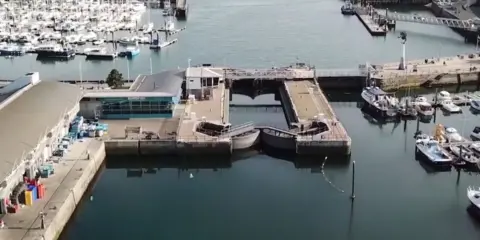Broken gates costing fishers 'up to £2k a day'
 BBC
BBCFishing businesses are calling for urgent repairs to the lock gates at Plymouth's Sutton Harbour.
The Plymouth Fishing & Seafood Association said fishers were losing between £1,200 to £2,000 a day because the problem reduced the time they had to fish and land catches.
Plymouth MP Luke Pollard has called on the Environment Agency to take urgent action to fix the gates and prevent further breakdowns.
The Environment Agency said repairs were a priority and work would start on Monday.
Edward Baker, CEO of Plymouth Fish and Seafood Association, said the broken gates meant access to the harbour was restricted to just one or two hours over each high tide.
"You get a short window to get in and out of the harbour which severely restricts fishing times.
"Some people are only getting to sea for a few hours. Others are coming back and they can't get into the harbour so they have to wait outside, possibly for six hours."
'Landing in Looe'
Mr Baker said fishers were losing between £1,200 to £2,000 a day.
"It's a substantial amount of money because either they can't fish or they've come back expecting to be able to get into the harbour and they can't so the fish spoils on board the vessel."
He said the problems were made worse by the closure of the fish market in Plymouth last year. Now all catches have to be transported to Brixham.
"If you miss the truck to Brixham then your fish is delayed two or three days before it gets to market, he said.
"Some vessels are actually going and landing in Looe but then they've got to send their crew back to Plymouth where they live and the crew then have to get back to Looe for 3am in the morning to sail again."
 Sutton Harbour
Sutton HarbourLuke Pollard, the Labour MP for Plymouth Sutton and Devonport, said he had written to the CEO of the Environment Agency calling for urgent action to fix the lock gates.
"Ever since I was elected, I've been campaigning to get these lock gates properly fixed. Time and time again they have broken, with it taking many months to fix," he said.
"We need a long-term solution to fix these gates, because every time they break it's fishers who suffer.
"That's why I'm calling for urgent action from the Environment Agency so that fishers can plan for what is happening, and a proper long-term solution so that the gates are properly fixed this time."

An Environment Agency spokesperson said fixing the lock gates was a priority.
"This structure has a vital role not just for the fishing community but the wider Plymouth area as a flood defence," they said.
"A submersible drone was used to rule out underwater damage, but divers will be needed to jack up the gate to begin repair work on Monday. The gates are expected to be operational before spring tides at the end of next week.
"Unfortunately, the footbridge over the gates between the Barbican and aquarium areas is not available while we carry out the repair and we thank the community for its patience while these essential works are completed."
The agency said the gates had received significant funded maintenance in the past three years and had worked hard to deliver the maintenance around the activities of the harbour and its users.
It said the lock gates operated in challenging marine conditions and inevitably some parts were "prone to wear and tear" and "stopped working despite planned preventative maintenance".
